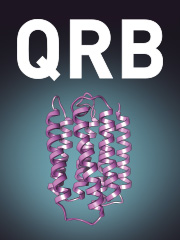Crossref Citations
This article has been cited by the following publications. This list is generated based on data provided by
Crossref.
Kurut, Anıl
Henriques, João
Forsman, Jan
Skepö, Marie
and
Lund, Mikael
2014.
Role of histidine for charge regulation of unstructured peptides at interfaces and in bulk.
Proteins: Structure, Function, and Bioinformatics,
Vol. 82,
Issue. 4,
p.
657.
Lam, Christopher N.
Kim, Minkyu
Thomas, Carla S.
Chang, Dongsook
Sanoja, Gabriel E.
Okwara, Chimdimma U.
and
Olsen, Bradley D.
2014.
The Nature of Protein Interactions Governing Globular Protein–Polymer Block Copolymer Self-Assembly.
Biomacromolecules,
Vol. 15,
Issue. 4,
p.
1248.
Maggs, A. C.
and
Podgornik, R.
2014.
Electrostatic interactions in the presence of surface charge regulation: Exact results.
EPL (Europhysics Letters),
Vol. 108,
Issue. 6,
p.
68003.
Moerz, Sebastian T.
and
Huber, Patrick
2014.
Protein Adsorption into Mesopores: A Combination of Electrostatic Interaction, Counterion Release, and van der Waals Forces.
Langmuir,
Vol. 30,
Issue. 10,
p.
2729.
Barroso da Silva, Fernando Luís
Boström, Mathias
and
Persson, Clas
2014.
Effect of Charge Regulation and Ion–Dipole Interactions on the Selectivity of Protein–Nanoparticle Binding.
Langmuir,
Vol. 30,
Issue. 14,
p.
4078.
Adžić, Nataša
and
Podgornik, Rudolf
2014.
Field-theoretic description of charge regulation interaction.
The European Physical Journal E,
Vol. 37,
Issue. 6,
Kaieda, Shuji
Lund, Mikael
Plivelic, Tomás S.
and
Halle, Bertil
2014.
Weak Self-Interactions of Globular Proteins Studied by Small-Angle X-ray Scattering and Structure-Based Modeling.
The Journal of Physical Chemistry B,
Vol. 118,
Issue. 34,
p.
10111.
Vinceković, Marko
Ćurlin, Marija
and
Jurašin, Darija
2014.
Impact of Cationic Surfactant on the Self-Assembly of Sodium Caseinate.
Journal of Agricultural and Food Chemistry,
Vol. 62,
Issue. 34,
p.
8543.
Heinen, M.
Palberg, T.
and
Löwen, H.
2014.
Coupling between bulk- and surface chemistry in suspensions of charged colloids.
The Journal of Chemical Physics,
Vol. 140,
Issue. 12,
Herling, Therese W.
Arosio, Paolo
Müller, Thomas
Linse, Sara
and
Knowles, Tuomas P. J.
2015.
A microfluidic platform for quantitative measurements of effective protein charges and single ion binding in solution.
Physical Chemistry Chemical Physics,
Vol. 17,
Issue. 18,
p.
12161.
Kusters, Remy
Lin, Hsiang-Ku
Zandi, Roya
Tsvetkova, Irina
Dragnea, Bogdan
and
van der Schoot, Paul
2015.
Role of Charge Regulation and Size Polydispersity in Nanoparticle Encapsulation by Viral Coat Proteins.
The Journal of Physical Chemistry B,
Vol. 119,
Issue. 5,
p.
1869.
Zubareva, A. A.
Shcherbinina, T. S.
Varlamov, V. P.
and
Svirshchevskaya, E. V.
2015.
Intracellular sorting of differently charged chitosan derivatives and chitosan-based nanoparticles.
Nanoscale,
Vol. 7,
Issue. 17,
p.
7942.
Shore, Joel D.
and
Thurston, George M.
2015.
Charge-regulation phase transition on surface lattices of titratable sites adjacent to electrolyte solutions: An analog of the Ising antiferromagnet in a magnetic field.
Physical Review E,
Vol. 92,
Issue. 6,
Wallerstein, Johan
Weininger, Ulrich
Khan, M. Ashhar I.
Linse, Sara
and
Akke, Mikael
2015.
Site-Specific Protonation Kinetics of Acidic Side Chains in Proteins Determined by pH-Dependent Carboxyl 13C NMR Relaxation.
Journal of the American Chemical Society,
Vol. 137,
Issue. 8,
p.
3093.
Li, Weimin
Persson, Björn A.
Morin, Maxim
Behrens, Manja A.
Lund, Mikael
and
Zackrisson Oskolkova, Malin
2015.
Charge-Induced Patchy Attractions between Proteins.
The Journal of Physical Chemistry B,
Vol. 119,
Issue. 2,
p.
503.
Adžić, Nataša
and
Podgornik, Rudolf
2015.
Charge regulation in ionic solutions: Thermal fluctuations and Kirkwood-Schumaker interactions.
Physical Review E,
Vol. 91,
Issue. 2,
Kurut, Anıl
Dicko, Cedric
and
Lund, Mikael
2015.
Dimerization of Terminal Domains in Spiders Silk Proteins Is Controlled by Electrostatic Anisotropy and Modulated by Hydrophobic Patches.
ACS Biomaterials Science & Engineering,
Vol. 1,
Issue. 6,
p.
363.
Arzenšek, Dejan
Kuzman, Drago
and
Podgornik, Rudolf
2015.
Hofmeister Effects in Monoclonal Antibody Solution Interactions.
The Journal of Physical Chemistry B,
Vol. 119,
Issue. 33,
p.
10375.
Qin, Li
Xu, Yisheng
Han, Haoya
Liu, Miaomiao
Chen, Kaimin
Wang, Siyi
Wang, Jie
Xu, Jun
Li, Li
and
Guo, Xuhong
2015.
β-Lactoglobulin (BLG) binding to highly charged cationic polymer-grafted magnetic nanoparticles: Effect of ionic strength.
Journal of Colloid and Interface Science,
Vol. 460,
Issue. ,
p.
221.
Lund, Mikael
2016.
Anisotropic protein–protein interactions due to ion binding.
Colloids and Surfaces B: Biointerfaces,
Vol. 137,
Issue. ,
p.
17.

